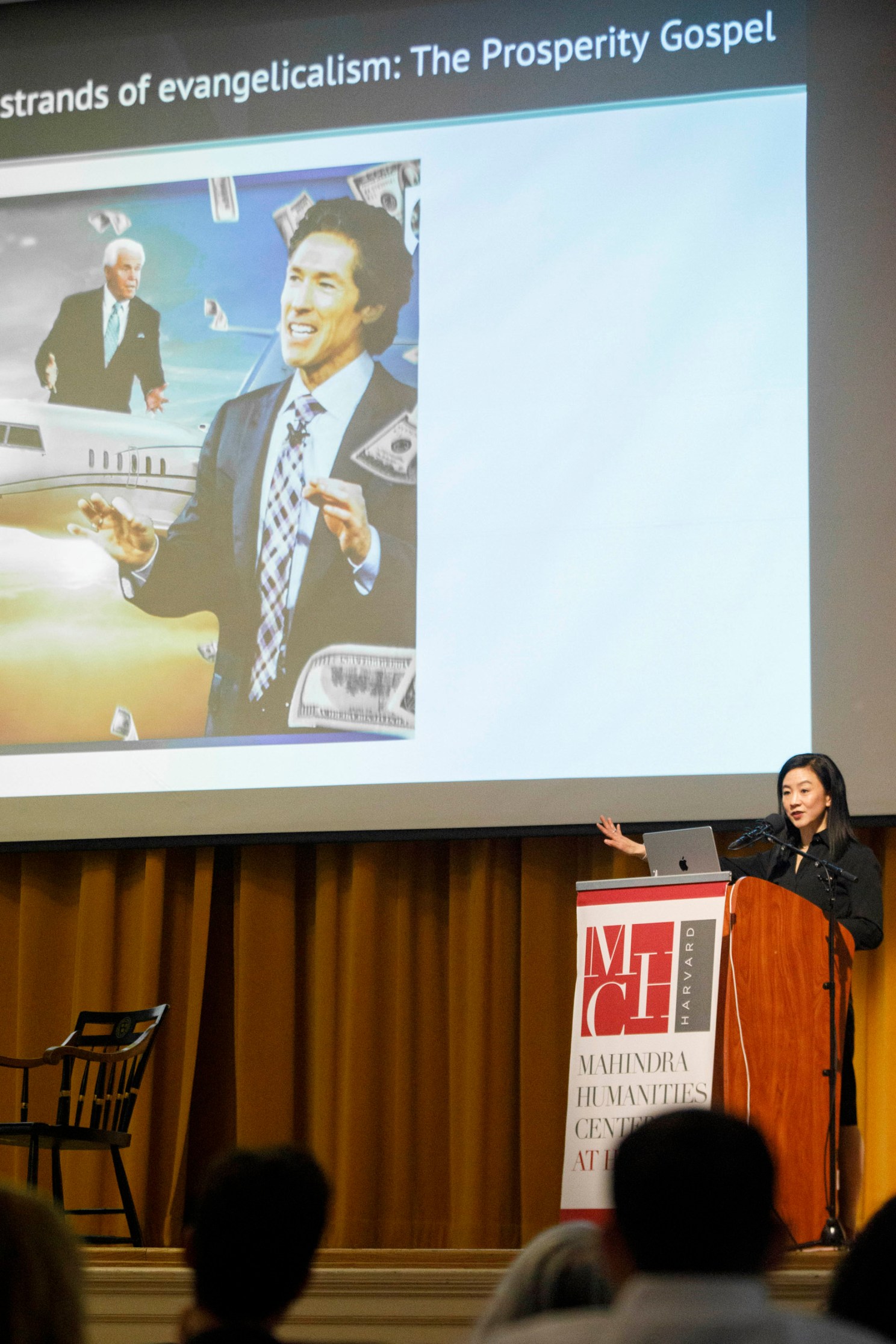Posting your opinion on social media won’t save democracy, but this might
Tanner Lectures explore models of engaged citizenry from ancient agoras to modern megachurches

Kris Snibbe/Harvard Staff Photographer
Donating money, signing petitions, and sharing views on social media are some of the common ways Americans exercise their civic duty. Hahrie Han ’97 says they aren’t enough.
The professor of political science at Johns Hopkins University, who delivered the first of the Tanner Lectures on Human Values at Paine Hall last week, said revitalizing American democracy will require an additional ingredient. She argued that today’s citizens are not given enough opportunity for collective activities that cultivate feelings of belonging and agency.
“Part of what we’ve lost in 21st-century America is a particular form of collective action that teaches people the commitments and capabilities of power-sharing that are necessary in pluralistic democracy,” said Han, who directs Johns Hopkins’ SNF Agora Institute and P3 Research Lab.
Interim President Alan Garber, Mahindra Center Interim Director Bruno Carvalho, and Professor of Government Eric Beerbohm introduced Han’s lectures, which were hosted by the Office of the President and the Mahindra Humanities Center.
The political acts most Americans engage in are low-risk and low-commitment and require little more than expressing one’s opinion.
Hahrie Han
In her lectures, Han said the political acts most Americans engage in are low-risk and low-commitment and require little more than expressing one’s opinion. Participants are interchangeable — signatures on a petition, bodies at a march.
“People are spoon-fed a menu of actions they can take that are most likely to be solitary, expressive acts, in which their individual gifts and complexities are ignored,” Han said.
Han’s solution is to design civic spaces in which people experience a sense of belonging while discussing, listening, and grappling with complex topics. To be politically effective, these diverse, small groups should be part of a larger structure without being hierarchical.
As an example, Han pointed to Crossroads Church, an Ohio megachurch with 35,000 regular attendees that in 2016 mobilized hundreds of volunteers to help with passing Issue 44, a ballot initiative that funded universal preschool to benefit low-income families in Cincinnati.
When Han, who studied the church over several years, asked members what motivated them to become civically engaged, most credited a church antiracism program. Led by an organization called Undivided, the initiative brought together thousands of congregants in small, multiracial groups to learn more about racial injustice. At the program’s conclusion, a group called the Amos Project stepped in to organize faith communities and provide “next steps” for getting politically engaged with a variety of pressing issues, including Issue 44.
“By nesting people within these carefully designed organizational structures, we can cultivate opportunities for them to realize their own agency, to connect with each other, and then to engage in a kind of deliberative action that’s necessary to make democratic action work,” Han said.
Responding to Han’s second lecture, Doran Schrantz, who was consulting for the Amos Project at the time, emphasized the critical moment when they harnessed the energy of the thousands of people who had been participating in the antiracism workshops and directed it toward a political end. “Undivided constructed social capital, it made more willing people, it fostered curiosity, it built trust and respect and built relational skills,” Schrantz observed.
Han cited other groups within the Crossroads Church community, such as a men’s social club, that offer ways for people to connect across difference, find belonging, and commit to further civic action. “People who are in these small groups can simultaneously draw the benefits of deep, intimate connection that comes from a small group, but also a sense of feeling connected to something larger than themselves, because of the large community they’re a part of,” Han said.
Faith communities are particularly well set-up for political organizing, especially megachurches which have the power that comes with massive numbers of loyal attendees, Han said. But other community-based organizations, like nonprofits, social clubs, libraries, and barbershops, have similar potential. Han and her colleagues at the SNF Agora Institute have an ongoing project in which they are mapping these civic spaces.
Moving forward, Han said it’s important to reframe what political participation looks like for most Americans, broadening their vision to include different kinds of collection action.
“Shifting this paradigm is particularly important, given the historical moment of uncertainty that we’re in right now,” Han said. “Too many of the civic opportunities that we provide are trying to get people to ‘do a thing,’ which is different from getting people to become the kind of people who do what needs to be done.”




